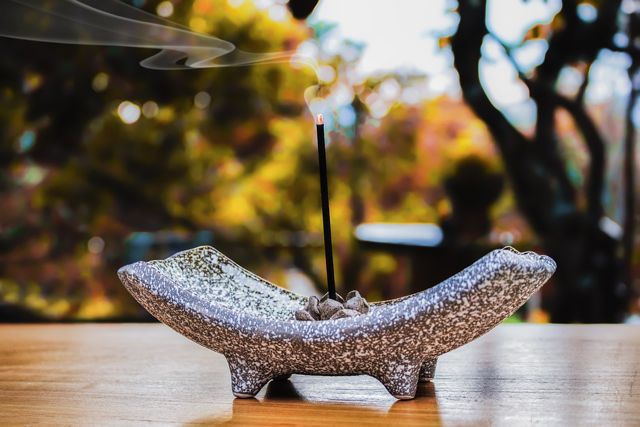
Twice a day, I light the candles on my altar, I burn incense as an offering and I bow to those ordinary, everyday statues. In that moment, they are transformed into celestial beings. They become a source of comfort, hey become spiritual guides, they become holy and sacred in a way that other statues are not. This transformation occurs because each time I bow in front of my altar I shift my relationship to the statues.
By Sensei Alex Kakuyo
In the meditation hall, I have an altar dedicated to Amida Buddha and the bodhisattvas Kannon and Jizo.
It contains three statues, which bear their respective images along with candles and an incense burner. The statues are of good quality, but they aren’t that different from other figurines. They’re white, standing approximately six inches tall. I bought them on Amazon, and for most of the day, there’s nothing special about them.
That changes, however, when I perform my Buddhist liturgy. Twice a day, I light the candles on my altar, I burn incense as an offering and I bow to those ordinary, everyday statues. In that moment, they are transformed into celestial beings. They become a source of comfort, hey become spiritual guides, they become holy and sacred in a way that other statues are not.
This transformation occurs because each time I bow in front of my altar I shift my relationship to the statues.
I treat them as holy objects, so they become holy. More than that, they help me find holiness within myself.
This occurs because there is no separation between our inner and outer worlds. In fact, Buddhism teaches that there is no outer world. Everything we experience is an extension of our mind. Thus, when we honor and venerate objects outside ourselves, we find that which is honorable and venerable within ourselves
There’s a word for this in religious circles—sacrament. A sacrament is a religious object or ritual that acts as an outward expression of our inner divinity. We have many sacraments in Buddhism, and I love them all. The robes, the incense, and the chanting all bring something special and mysterious to the practice.
For me, it’s easy to bow to Buddha. It’s easy to care for my robes. It’s easy to sweep the meditation hall. But it’s much harder to bow to a dirty toilet. It’s much harder to care for dirty laundry. It’s much harder to wash dishes, make laundry, and empty the litter box. It’s harder to do these things because they are ordinary.
But if Buddhism has taught me anything, it’s that we don’t seek out a holy life. As Buddhists, we take the life we have, and we make it holy.
When we bow to the statues on our altar they become celestial beings. When we bow to our ordinary life, it becomes a gateway to enlightenment. We cut the grass with the same urgency that we sweep the meditation hall. We fold our robes and our laundry with equal care. And we clean the dirty toilet with the same reverence we offer the Buddha and Bodhisattvas.
When we do this our life becomes a mirror; reflecting our own divinity back at us. And we see the sacred nature of all things.
Namu Amida Butsu
Photo: Pixabay
Check out the author’s personal blog here.
Did you like this post? You may also like:
Hand Wash Cold: Care Instructions for an Ordinary Life. {Book Review}
Comments
- Saving the World is Hard (But We Can Start by Making the Bed) - January 9, 2024
- No Shortcuts to Inner Peace - November 28, 2023
- Why I am Not a Minimalist (anymore) - November 8, 2023




